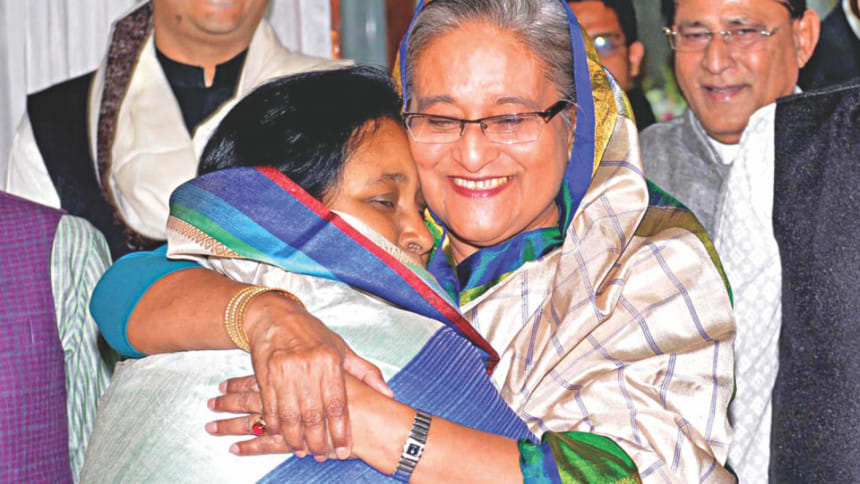What led to Ivy’s win

Clean image, personal charisma and her strong stance against criminalisation of politics in Narayanganj were the X factors for Selina Hayat Ivy's sweeping victory in Thursday's mayoral race.
Ivy, 50, built such an image by standing up to the “evil force” in Narayanganj and by undertaking various development projects as mayor over the past five years, said voters, political leaders and civil society members.
Her win for a second time running will mean more development in the city and the space for criminal activities will shrink further, they noted.
BNP candidate Shakhawat Hossain Khan too has a clean image, but he is new in politics, never holding any public office before. Also, intra-party feud and a lack of coordination among party leaders cost the 47-year-old lawyer some votes.
IVY'S X FACTORS
A group of Narayanganj district AL leaders tried to eliminate Ivy from local politics after the grassroots did not send her name to the party top brass as their candidate. They instead sent names of three district leaders.
But the central AL picked Ivy as party candidate and party chief Sheikh Hasina held a meeting with the district leaders to resolve the longstanding conflict between Ivy and Shamim Osman.
Although Narayanganj, once dubbed as Dundee of east, had once earned a bad name for abuse of power and poor law and order, Thursday's election saw no violence or polls irregularities, according to officials and political analysts.
The river port city of about 5 lakh voters grappled with crime and corruption for a long time, for which locals and law enforcers point the finger at an influential family there.
But this has changed since Ivy took office in 2011, when the first NCC election was held.
This, in addition to the development works and her bold stance against Shamim Osman, played a key role in her win for a second time. Also, her campaign plan was well thought out.
Rafiur Rabbi, a close aide to Ivy, said, “Ivy is popular among people of all political parties because she took a firm stance against an evil force in Narayanganj. Not only Awami League voters, but voters from all political parties voted her.”
Some major development works under her watch in the last term include eradication of the city's chronic waterlogging problem; construction of roads throughout the city, including the four-lane road in Bandar; and building of parks. She is also credited with the recovery of all the grabbed land from illegal occupiers.
Asked about the law and order in the city, Additional Superintended of Narayanganj police Faruk Hossain yesterday said, “In the last five years, law and order improved significantly. In the past, drugs used to be sold openly. It's a rare scene now.”
He added that Ivy never interfered with their work or asked them to go soft on any criminals. “She played a good role as mayor.”
Ivy took office in 2011, defeating Selim Osman, who was backed by the AL in that election, by more than one lakh votes.
This time, she got 1,75, 611 votes, beating Shakhawat by 79,567 votes. Shakhawat bagged 96,044 votes the NCC polls in which about 63 percent voters cast ballots.
“By electing her again, people of Narayanganj have sent a clear message that they do not want criminals in power,” Mahbubur Rahman, president of Narayanganj Press Club, told The Daily Star.
For voters, someone from the party in power means more development.
“The Awami League is in power and being an AL candidate Ivy can work better. If elected, Shakhawat could not do much as he is a BNP candidate,” said Sahidullah, a voter in Chashara.
WHY SHAKHAWAT LOST?
The BNP has three groups in Narayanganj. Taimur Alam Khandakar leads the faction in city area, Md Giasuddin in Siddhirganj and Abul Kalam Azad in Bandar area.
Taimur is president of Narayanganj district BNP and Giasuddin and Azad are former MPs.
Because of the grouping, there was little coordination among local leaders, sources said.
Also, Shakhawat is a stranger in politics. He got BNP's nomination after senior district leaders declined to join the race.
But after getting nomination, he did not sit with the district leaders to unite them to work for him, a senior local BNP leader said.
During the campaign, Taimur, Giasuddin and Abul Kalam were seen active only when the central leaders went to the city to campaign for Shakhawat.
These three were busy with ward councillor candidates. Taimur's brother Khorshed Alam Khandkar and Giasuddin's son Sadril won councillor posts.
“BNP-backed candidates bagged 15 ward councillor posts [out of 27]. But our mayor candidate lost. District leaders were busy campaigning for their relatives [councillor candidates], not for the mayoral candidate,” said Shahed Alam, joint convener of city unit Chhatra Dal, a pro-BNP student body.
On the election day, presence of BNP leaders and activists on the street or outside the polling stations was thin.
Asked about this, Shakhawat said BNP voters were scared and that's why they did not turn up at the voting centres.
City BNP General Secretary ATM Kamal said many people abstained from voting as they lost confidence in the polls process.
But Shaheen, a local BNP activist, said, “Shakhawat lost because he failed to bridge the gap with local BNP leaders. Intra-party feud and lack of coordination among leaders cost him the election.”

 For all latest news, follow The Daily Star's Google News channel.
For all latest news, follow The Daily Star's Google News channel. 



Comments